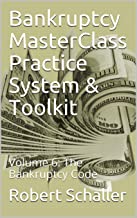Bankruptcy Masterclass – Volume 6: The Bankruptcy Code
$250.00Every attorney should read this book cover to cover before filing his/her first Chapter 7 bankruptcy case. This book explains the nuts and bolts of filing Chapter 7 – giving attorneys the confidence to provide competent representation to clients by exceeding the minimum competency level of the profession and exercising the skill, knowledge and ordinary care exercised by other attorneys.
The goal of this book is to provide attorneys with a structural framework of the bankruptcy process, including a working knowledge of the relevant statutory and judicial authorities. The six types of bankruptcy cases are discussed before examining Chapter 7 eligibility requirements. Next, a day-by-day timeline is presented for a standard Chapter 7 case. Then, the roles of the U.S. trustee and Chapter 7 standing trustee are explored. Plus, the 11 U.S.C. § 341 meeting of creditors is explained followed by a sample Q&A of a typical § 341 examination. Of course, the 11 U.S.C. § 362 automatic stay protections and 11 U.S.C. § 727 bankruptcy discharge are discussed. Typical debtor motions are discussed with text of sample motions provided.

